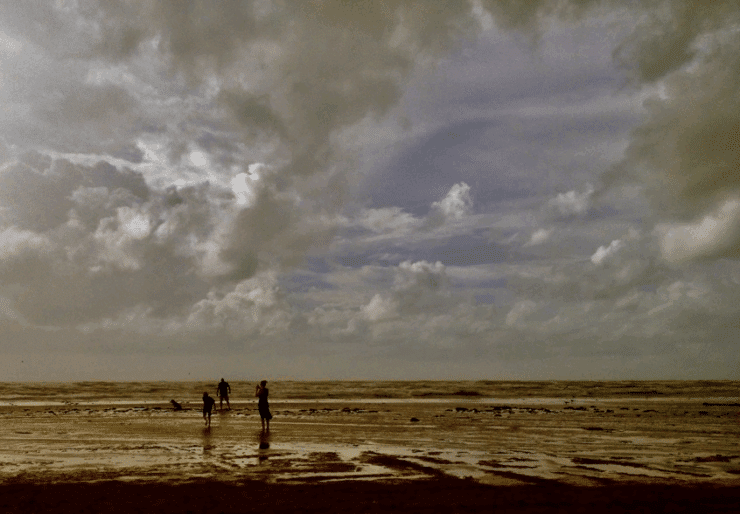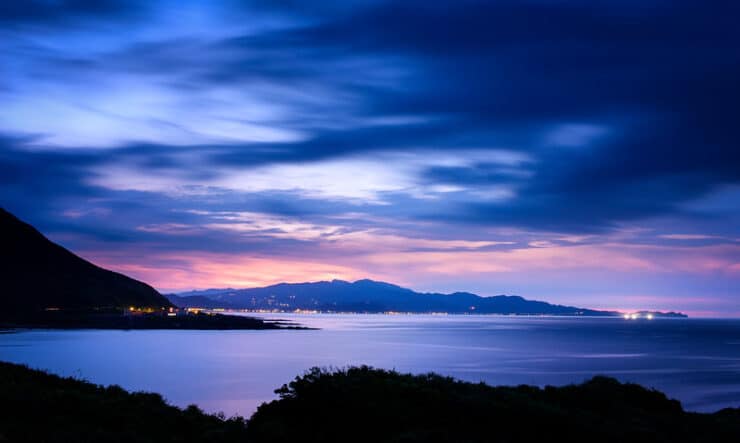In the words of Rachel Carson, from her book The Sea Around Us, “if there is poetry in my book about the sea, it is not because I deliberately put it there, but because no one could write truthfully about the sea and leave out the poetry.”
I’ve lived in central Texas for most of my life, first coming to the Texas Panhandle with my dad’s brief assignment to Amarillo AFB when I was in high school, and then coming to Austin as a wife and soon-to-be mother in 1968. For a girl who loves swimming and the sea as much as I do, I’m surprised I’m still here. My children grew up in Texas, and I’ve clearly grown roots I did not have as a child.
One of my most moving ocean experiences happened when I lived on an island, Terceira, in Portugal. It was a tragic day of beaching whales, and I wrote a coming-of-age nature essay and will share it in a future column. When I was very young, we’d often visit Rehoboth Beach on the coastline of Delaware, and for years, as adults, my sister and I had a pact that we’d meet and go there for a week each September (telling no one) for a respite to a place we loved where I’d swim the shoreline and my sister would hunt seashells. It was our connection to our past and our bond. I’ve always been lured by water, so let’s talk poetry, for the sea surely calls to the poets.
 First, there’s Emily Dickinson, reclusive, and do we really know if she ever went to the seashore? Following is an excerpt of a favorite poem of hers:
First, there’s Emily Dickinson, reclusive, and do we really know if she ever went to the seashore? Following is an excerpt of a favorite poem of hers:
I started Early – Took my Dog –
And visited the Sea –
The Mermaids in the Basement
Came out to look at me …
—excerpt from Emily Dickinson, I started Early — Took my Dog
The light easiness of “I started Early — Took my Dog — ” in the first stanza appeals to me. “The Mermaids in the Basement” so endearing, but Dickinson, the master of metaphor, takes this poem much deeper into desire and sexual encounter with the sea (or perhaps not the sea). This Dickinson poem speaks to me, and a couple years ago I, too, wrote a poem about the sea as my lover, In the Sway of Tides.
Clearly, many of us are lovers of the sea, for as I read my email this morning, I came across another such poem by a poet I follow on Medium. I Am the North Sea’s Wife is authored by Jennifer Chante and first published in The Mad River Journal. Here is an excerpt, a stanza, of her splendent poem:
I remember our wedding day:
salt-glitter garlands draped
the marsh creeks and islands.
The moon opaled,
shining the mud silver. My bouquet,
samphire, sea thistle and aster.
— excerpt from Jennifer Chante, I Am the North Sea’s Wife
Oh, the images and wordplay in Chante’s verse! I write endlessly of the oceans as well as poems about swimming in the pool, and here is one of my many sea poems:
The Scent of Saltwater
Landlocked all these years,
I’ve almost forgotten
the smell
of the ocean.
its fiery fragrance
loitering like clouds
shadowed on the sea,
scent of seaweed soaked
in saline, algal garlands
in the sensual ebb of tides—
the bouquet of eternity
pungent with yesterdays,
tart perfume of tomorrows
riddled with storms and calm
in the endless waves
of revival, where
I am brined
and bathed in holy water.
— Sandra Fox Murphy
I’m certainly not alone in my love of water, of the seas, and here is a lovely poem by John Masefield:
Sea-Fever
I must go down to the seas again, to the lonely sea and the sky,
And all I ask is a tall ship and a star to steer her by;
And the wheel’s kick and the wind’s song and the white sail’s shaking,
And a grey mist on the sea’s face, and a grey dawn breaking.
I must go down to the seas again, for the call of the running tide
Is a wild call and a clear call that may not be denied;
And all I ask is a windy day with the white clouds flying,
And the flung spray and the blown spume, and the sea-gulls crying.
I must go down to the seas again, to the vagrant gypsy life,
To the gull’s way and the whale’s way where the wind’s like a whetted knife;
And all I ask is a merry yarn from a laughing fellow-rover,
And quiet sleep and a sweet dream when the long trick’s over.
— John Masefield
And then there’s the poet Juan Ramón Jiménez from Spain. He came to love the sea as a child growing up near Cadiz. His line “If they give you ruled paper, write the other way,” is oft quoted, and the Nobel Prize winner’s most popular book, Platero y Yo, is a lyrical account of travels with his donkey. His love of the sea rings loud and, sometimes, metaphorically in his dual-language collection of poems, The Poet and the Sea. From this collection, here are two excerpts from his eight-part poem “The New Sea.”
Your movement, your restlessness calm me.
You’re the only one who knows
how to just be yourself, just you
the lone and only one who allows no
response to your waves, your words,
to the haughty light’s question.
…
You alone, sea, know everything.
You forget everything;
You alone, sea, are self-sufficient and more
You are, and you cease to be, simultaneously, everything.
— excerpts from “The New Sea” by Juan Ramón Jiménez
Paintings and photographs inspire me and often result in ekphrastic poetry. The following villanelle is one of my own, inspired by the photograph I took one year as we left Mustang Island on the Texas coast as a hurricane churned in the Gulf.

Photo by Author
Captured Moment
The sky browned moody as
the hues of a storm
swirled like a painting
and I cradled the camera
as we lingered near the sea
and the sky browned moody as
a hurricane loomed offshore
where my family frolicked in the surf
as it swirled like a painting,
silhouettes, like children, swathed
in the draw of the waves that echoed
the sky browned moody as
I focused the portrait
of our farewells in a frame
where the sky browned moody
and swirled like a painting.
— Sandra Fox Murphy
Your Turn
What are your memories of the ocean? For some it’s fear—of the unknown, of what might be swimming unseen. For others, it’s the largeness of the sea, how small it makes us feel, its magic and secrets. Remember, it’s three-quarters of our planet—let’s embrace it and take better care of it. And, of course, write about it! Don’t forget about the sea glass, the tides, the sea turtles, and the marshes, for as Rachel Carson wrote, “the edge of the sea is a strange and beautiful place.”
Photo by 白士 李, Creative Commons license via Flickr. “Sea-Fever” by John Masefield is in the Public Domain. Poems by Sandra Fox Murphy and Mustang Island photo used with permission. Post by Sandra Fox Murphy.
- Poet Laura: The Verdant Respite of Portugal + New Poet Laura Introduction - October 1, 2025
- Poet Laura: In the Glow of the Desert - September 3, 2025
- Poet Laura:In the Sway of Tides - August 6, 2025

Glynn says
It is the smell that
lingers in memory,
the smell of salt and
water and wet sand
combining into what
I call the sea. Then
the sound, as waves
crash to shore
to the chorus of birds
hoping for a meal
washing up, or
ebb quietly away
in froth. Finally,
the grit, grains
of beach that work
themselves into
every swimsuit
and gush between toes
and teem with crabs
and sand dollars
and beg to be shaped
into castles and dreams
soon washed away.
Sandra Fox Murphy says
Love it, Glynn. Speaking my language!
Bethany says
Your poem, “The Scent of Saltwater ,” is gorgeous.
“the smell
of the ocean.
its fiery fragrance
loitering like clouds
shadowed on the sea,”
Sandra Fox Murphy says
Thank you, Bethany! Living in central Texas, I do miss the oceans, and it comes out in my words.
L.L. Barkat says
Oh, goodness. I love the pact you and your sister made, especially that the place was secret! 🙂 And that it involved the sea. Which is an enduring love for me.
And that photo you took of the Gulf!!! Wow. Looks like an Andrew Wyeth painting. 🙂
Sandra Fox Murphy says
Yes, L.L., those trips stopped in 2020. Just this past week I mentioned it to my sister (in Hampton, VA) about doing it again … but I could sense her health issues lead her to declining. We had all our favorite spots to go at Rehoboth, loved sitting by the shore (always September), and I loved swimming in that dang cold Atlantic. Special memories, and perhaps one more rendezvous if I can persuade her.
Re the photo, it was one last romp in the storm-stirred water on the way home. Funny you should mention Andrew Wyeth … I have a poem about him, Shades of All the Leaves. It’s an ekphrastic poem about his “Helga years.” I love his work, but there was mischief!
Don says
Enjoyed vicariously your sea ventures. Especially the east coast and the last gulf storm picture. So vivid in my mind my experiences body surfing on the florida coast and 9 months on Johnston attoll. Hope you and your sister get to reunite at Rehaboth Beach gain.
Laura Boggess says
Sandra, your poem “The Scent of Seawater” is a feast for the heart! So lovely. Thank you for sharing all these bits of beauty that stir such fond memories for me. Our yearly trip to the OBX is coming up soon. Maybe I’ll be inspired to write some poetry while being kissed by the sun and the salt-crusted winds.
Sandra Fox Murphy says
Thanks, Laura! My sister (in Hampton, VA) loves her trips to the OBX with her daughters. Have fun and soak up the sun and salt.
Michelle Ortega says
Loved this post, Sandra. Sea-lover here, too! Made it to the Jersey shore yesterday for the first time in a couple of summers and it was a perfect day.
Your photograph captures an other-worldly forboding, a true “sky browned moody.”
Sandra Fox Murphy says
So glad you enjoyed all the sea poetry, Michelle! I do miss living near the sea; my best memories are there. It was eerie how that storm in the Gulf stirred all the silt through the water where the sky and the water and the sand all became the same color.